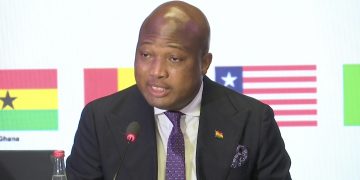At a youth-focused workshop organized by Skill Force Ghana under the theme “Entrepreneurial Mindset and Leadership for the Youth,” New Patriotic Party (NPP) presidential candidate hopeful Kennedy Ohene Agyapong delivered a candid speech on the cultural challenges impeding business growth in Ghana.
His remarks highlighted the detrimental impact of familial involvement in businesses and the need for a shift in mindset towards honesty, discipline, and competitiveness.
Kennedy Agyapong, a well-known businessman and politician, argued that Ghanaian culture, particularly the practice of prioritizing family members over qualified professionals in business, is a major factor in the collapse of enterprises.
He urged young entrepreneurs to adopt a disciplined and merit-based approach, emphasizing that businesses should be built on competence rather than nepotism.
The former Assin Central Member of Parliament pointed out that many Ghanaian businesses fail because owners feel obligated to employ family members who often lack the necessary skills and dedication.
“If you build your business around family members who are incompetent, you are setting yourself up for failure,” he stated.
According to Mr. Agyapong, businesses must be run as professional institutions rather than as family welfare schemes. “The moment your business starts making money, relatives expect to be employed whether they are qualified or not. Instead of contributing to the company’s success, they see it as a source of free income,” he explained.
He cited examples of successful multinational companies that have thrived by hiring the best talent available, regardless of family ties.
He urged Ghanaian entrepreneurs to adopt the same approach, arguing that separating business from family obligations is crucial for sustainability.
Beyond nepotism, the former MP also criticized the prevailing cultural attitudes towards business ethics, hard work, and discipline.
He lamented that dishonesty is pervasive in the Ghanaian business environment, with many entrepreneurs losing investments due to fraudulent activities. “Honesty is the foundation of trust in business. If you lack integrity, no serious investor will work with you,” he said.
He also pointed out that many Ghanaian businesses fail because owners do not reinvest profits into expansion but rather spend lavishly on personal luxuries. “Some business owners, as soon as they start making money, prioritize buying expensive cars and throwing extravagant parties instead of growing the business,” Agyapong observed.
To succeed in the competitive global market, he advised young entrepreneurs to cultivate a strong work ethic and financial discipline. “You have to work hard, remain focused, and reinvest your profits wisely. This is the only way to grow a sustainable business,” he stressed.
He further pointed out that Ghanaian businesses struggle to compete with foreign-owned enterprises due to a lack of strategic planning and investment in infrastructure.
“How can we compete with Indian and Chinese businesses when they have long-term plans and invest in their operations while we focus on short-term gains?” he questioned.
He noted that foreign businesses in Ghana often dominate key industries because they have access to cheaper credit, better infrastructure, and a stronger business culture.
“Foreign companies are structured, disciplined, and reinvest profits into business expansion. If we don’t change our attitude, we will always lag behind,” he warned.
He also criticized the lack of technological adoption in many Ghanaian businesses, stating that entrepreneurs must embrace innovation and digital solutions to remain competitive. “In today’s world, if you don’t leverage technology, you will be left behind. We need to modernize our businesses,” he urged.
As a solution, Mr. Agyapong called on young entrepreneurs to prioritize skills, competence, and discipline over cultural norms that stifle business growth.
He encouraged business owners to hire professionals based on merit and hold employees accountable for performance.
He also emphasized the importance of honesty and transparency in financial dealings. “If you want to attract investors and business partners, you must be trustworthy. No one wants to do business with someone who lacks integrity,” he advised.
Furthermore, he urged the government to create a more conducive environment for businesses by reducing bureaucratic red tape, providing access to credit, and investing in infrastructure.
“The government must support local businesses to compete with foreign investors. Without policy changes, Ghanaian entrepreneurs will continue to struggle,” he said.
Source: www.kumasimail.com



































































